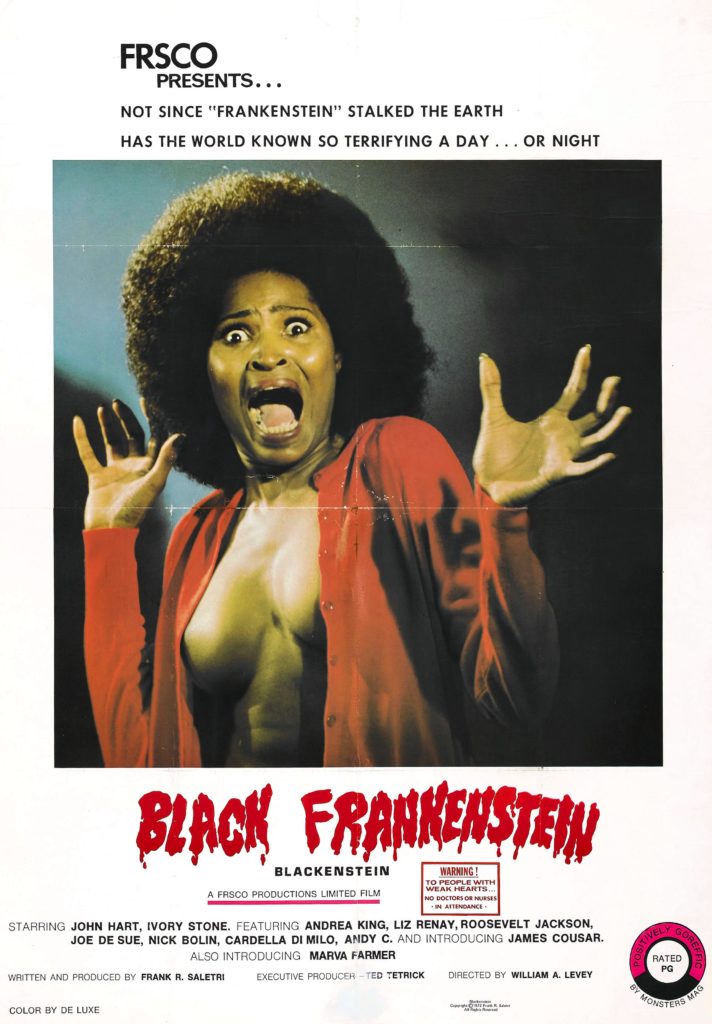
BLACKENSTEIN is indefensible.
I don’t think there’s anything particularly controversial about this viewpoint within the cult film fandom community. Known more for its title than anything resembling quality, BLACKENSTEIN is often regarded as the nadir of African-American-themed horror cinema of the ‘70s, a group of films that peaked with the likes of BLACULA, J.D.’S REVENGE and GANJA AND HESS, muddled through a lot of mediocrity and resulted in a few genuinely awful duds. BLACKENSTEIN is generally regarded as the dudliest of those duds, due to both the undeniable allure of the title and the ineptness of the film itself.
That Severin Films has released BLACKENSTEIN (the title card gives the more complete BLACKENSTEIN THE BLACK FRANKENSTEIN) on Blu-ray in a brand-spanking-new transfer that looks fantastic is surely one of the signs of the apocalypse. Even more strange is the fact that being able to see the film in all its garish glory, coupled with the features that delve into the backstory of producer Frank R. Saletri, makes BLACKENSTEIN’s awfulness even more mysterious and alluring. After all of the bonus features, the question of why BLACKENSTEIN exists in such a misguided, unpolished state becomes a greater puzzle than ever.
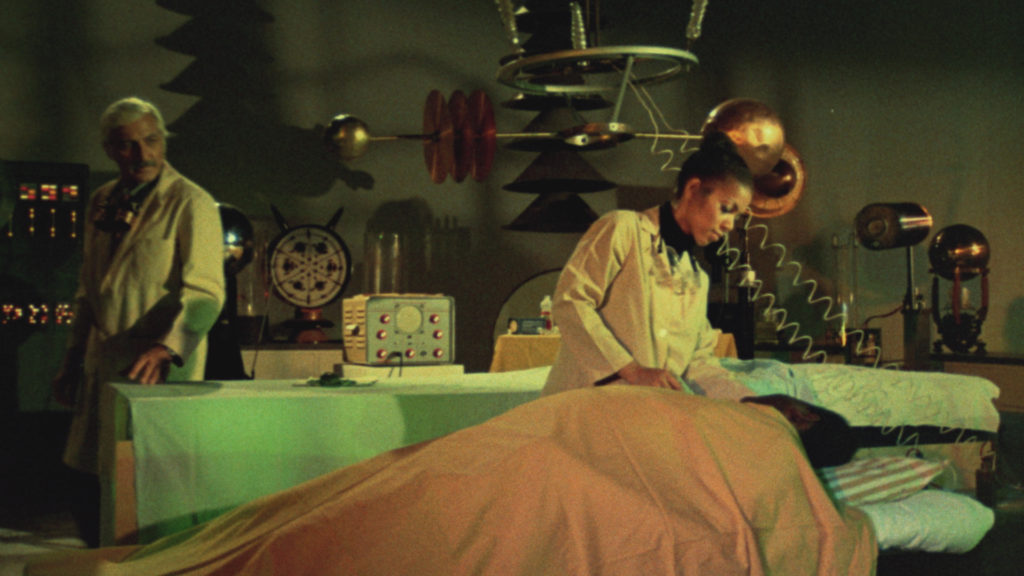
The plot of the film itself is rudimentary. Eddie Turner (played by Joe De Sue, who literally is not shown to be able to walk and talk simultaneously) returns from Vietnam a quadriplegic confined to being beneath the covers of a hospital bed save for his head, where he’s yelled at by a belligerent, incoherent hospital employee. His fiancée Winifred (Ivory Stone) goes to see her former teacher Dr. Stein (former Lone Ranger John Hart, who recites every line as though he’s narrating a ‘50s sex hygiene scare film) for assistance, as he’s just received a Nobel Peace Prize for DNA research.
Dr. Stein, you see, has made his home a mini-hospital for some of his patients, and Eddie is soon moved in and Stein, assisted by Winifred and his orderly/manservant Malcomb (Roosevelt Jackson), begins treatment to transplant new limbs onto his body. However, things go bad when Malcomb gets jealous and switches the formula, causing Eddie to regain his limbs but become a Neanderthal, his forehead expanding in size and his brain devolving. He then starts killing people (including a small role by cult fave Liz Renay), but Dr. Stein and Winifred are oblivious because while they may be masters of science, they’re not very good at observing multiple murders happening around them.
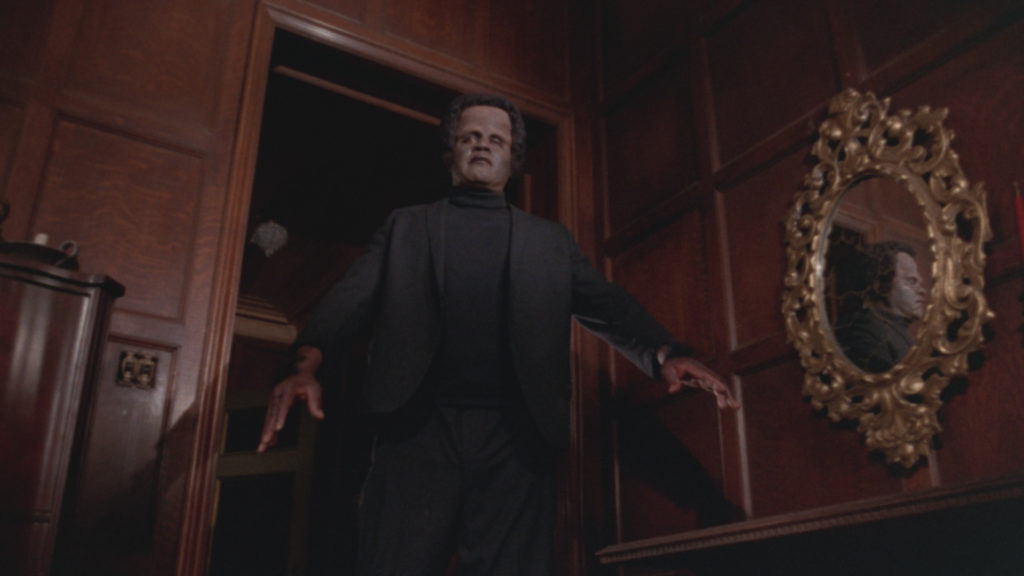
Very little of this makes sense, but that normally wouldn’t matter too much when it comes to wringing entertainment value out of a low-budget “gothic” horror film made with an emphasis on chaos and exploitation rather than coherence. BLACKENSTEIN, however, puts the emphasis on walking. People walk from one place to another. The titular creature (or at least the “monster” – he’s not even a Stein, for Pete’s sake) moves with such a languid pace and the film feels the need to stay focused on his every move no matter how long it takes him to climb a flight of stairs.
The Blu-ray release includes both the restored 78-minute version of the film from a 35mm negative, and the longer, 87-minute cut with the added footage coming from a 1” video master. The difference seems entirely composed of an additional 9 minutes of people walking.
On a purely aesthetic level, BLACKENSTEIN is a terrible movie. The science is laughable, the dialogue is stilted and inhuman (when Dr. Stein is told about Eddie’s condition, he replies “I’m sorry to hear that” as though he’s down with a cold), and the general pacing, even at 78 minutes, is drudgery. The climax is astonishingly ridiculous. Even the exploitation elements are poorly handled – the nudity is minimal, and while the little bits of gore have some degree of impact due to the lush, garish colors of the restoration, it takes a while to get there, and it’s really not much of a pay-off for drive-in devotees.
On the plus side, Ivory Stone emerges pretty much unscathed, though the experience apparently prevented her from doing any other films. There’s also some nice music, courtesy of Cardella DiMilo, who would later go on to appear in Rudy Ray Moore films and play Ella Fitzgerald in PIRATES OF SILICON VALLEY(!). The new transfer is so beautiful that it feels almost inappropriate, as BLACKENSTEIN feels like the sort of movie that you watch in a half-asleep dream state at 3 am on a crummy UHF station with a channel number that could double as an I.Q., but it’s certainly the results of some fantastic work on the restoration team as it’s a huge upgrade from the earlier DVD release from Xenon, a straight VHS transfer. At least the lab set is colorful, like a rendition of a classic FRANKENSTEIN set done on a miniscule budget but enhanced with some colorful lighting. That’s about as nice as I can be to the film itself.
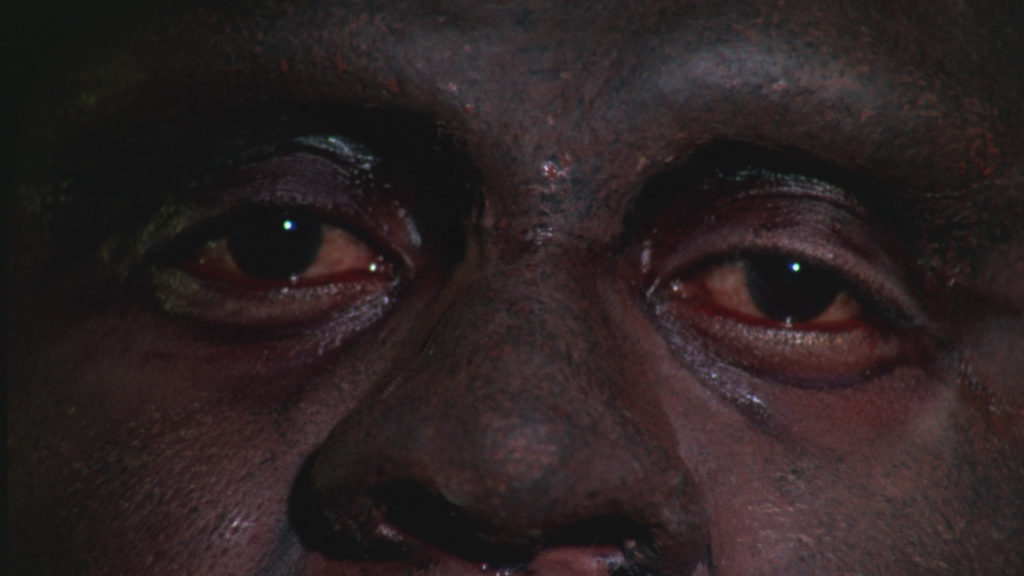
The sole extra on the Blu-ray coming from someone who worked on the film is an interview with make-up artist Bill Munns, who created the (admittedly good) enhanced forehead on Eddie. It’s a solid interview, though it mostly delves into the low-budget nature of working on the film and the affability of actor De Sue, who was a good sport about the makeup treatment.
Most of the features, however, focus not on BLACKENSTEIN itself, but on its writer and producer, Frank R. Saletri. A one-time actor and lifelong horror fan, Saletri became a Los Angeles attorney who specialized in show business clients, including actress Liz Renay (explaining her presence in the film) as well as Ken Osborne and Robert Dix, who recall him as an eager writer and jovial gentleman. In addition, his sister June Kirk talks about his upbringing, and shows off his collection on horror scripts for films that were never made as well as finally putting an end to the rumor of the existence of BLACK THE RIPPER.
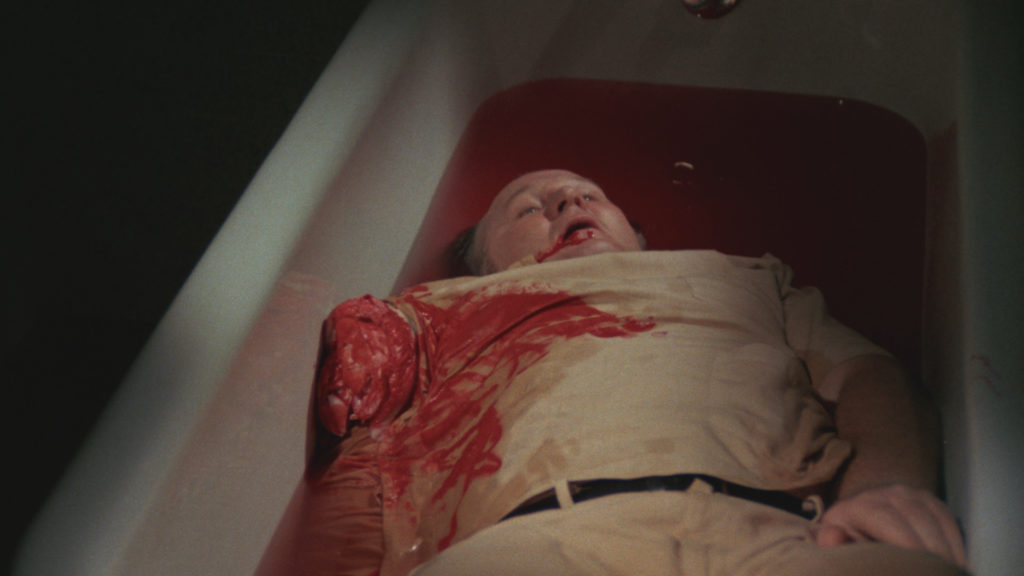
The final extra feature is a vintage news broadcast about Saletri’s mysterious death, a murder that remains unsolved. His demise is mentioned by the other interviewees as well, but with no real course of investigation, it remains as enigmatic and unknown as the film itself. (Oddly, director William Levey isn’t present on the features, though I’m sure it’s not for lack of trying. I don’t believe Levey has ever contributed to a DVD, though maybe he’ll get to talking about it on YouTube sometime.)
The emphasis on Saletri’s Hollywood connections and love of horror and show business make BLACKENSTEIN even more of a puzzle. For example, how does someone with such a passion for vintage horror films destroy the basic premise of FRANKENSTEIN so badly? The story of FRANKENSTEIN is one of the morality of the creation of life and how something new reacts to and is reacted to by the world around it – BLACKENSTEIN, by being the story of some guy that gets his limbs back and then just starts wandering around killing stuff, has none of the themes of the original story and offers absolutely no ideas in its place. Even the science fiction aspects are completely laughable – it’s as though Saletri heard that DNA has something to do with genetics and the body and ran with it, just throwing “DNA” around whenever the script needed to throw something scientific into an explanation. Even the title doesn’t make any sense, as Dr. Stein isn’t black, and the monster figure isn’t his offspring in any way.
In addition, there’s never any real reasoning as to why the film is set up as a Blaxploitation film at all. While all of the primary characters (save for Dr. Stein) are black, the film offers nothing in the way of racial context or commentary on the experience of being black in America in 1972 – outside of a joke told by comedian “Andy C” at a comedy club (edited out entirely from the theatrical cut), there’s no mention of race anywhere in the film. In normal circumstances, I’d give it a little bit of credit for not having race define or motivate the characters, but in a movie called BLACKENSTEIN, you’d expect the race of the characters to somehow come into the equation.
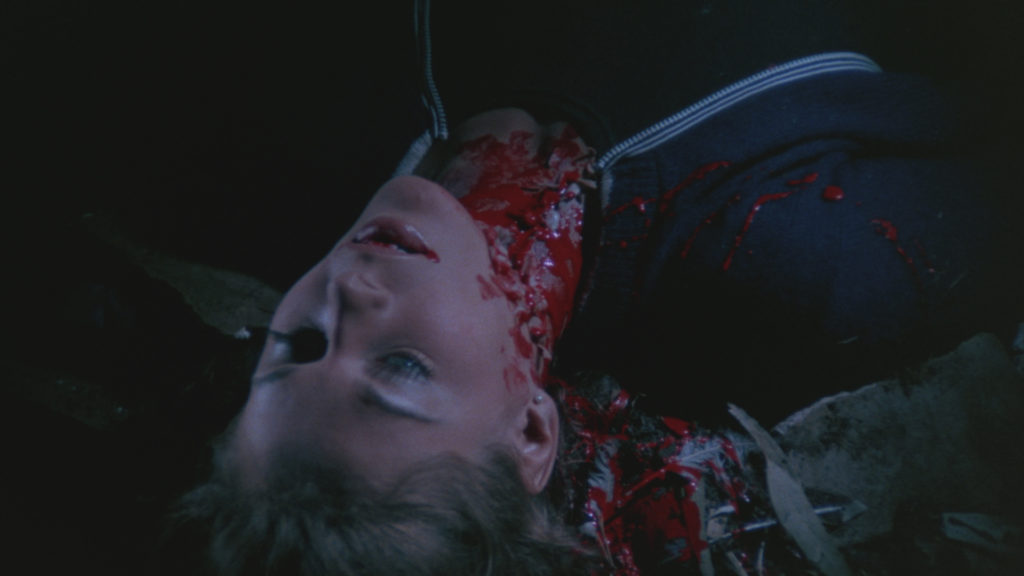
It’s a rare case where the special features actually make a film less knowable, but that’s the case with BLACKENSTEIN – the more insight you get into who Saletri is, the more you wonder why such a great horror fan bothered creating and releasing such a slapdash, inexplicable thud of a movie, one that manages to mix two good concepts together and completely destroy both of them entirely.
But the sheer awfulness of BLACKENSTEIN, the movie, is what makes BLACKENSTEIN, the Blu-Ray, a relatively compelling experience for low-rent ‘70s exploitation fans. Sure, the movie is unsalvageable, but it’s never looked better (and it might play just fine as a background video at a Halloween party now), and the extras Severin has added just make the film even more enigmatic than it ever had been before.
- JIM WYNORSKI RETURNS WITH THE CREATURE FEATURE ‘GILA’ - May 1, 2014
Tags: Bill Munns, Blackenstein, Blu-ray, Cardella DiMilo, Frank R. Saletri, Ivory Stone, Joe De Sue, June Kirk, Ken Osborne, Liz Renay, Robert Dix, Severin Films, William Levey

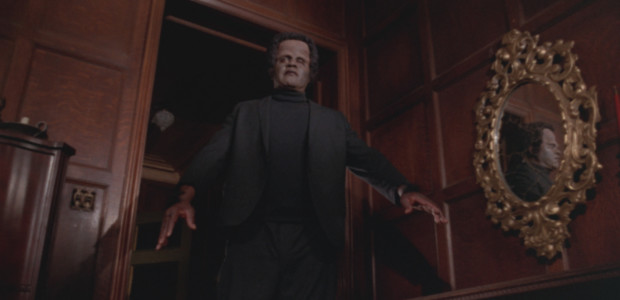
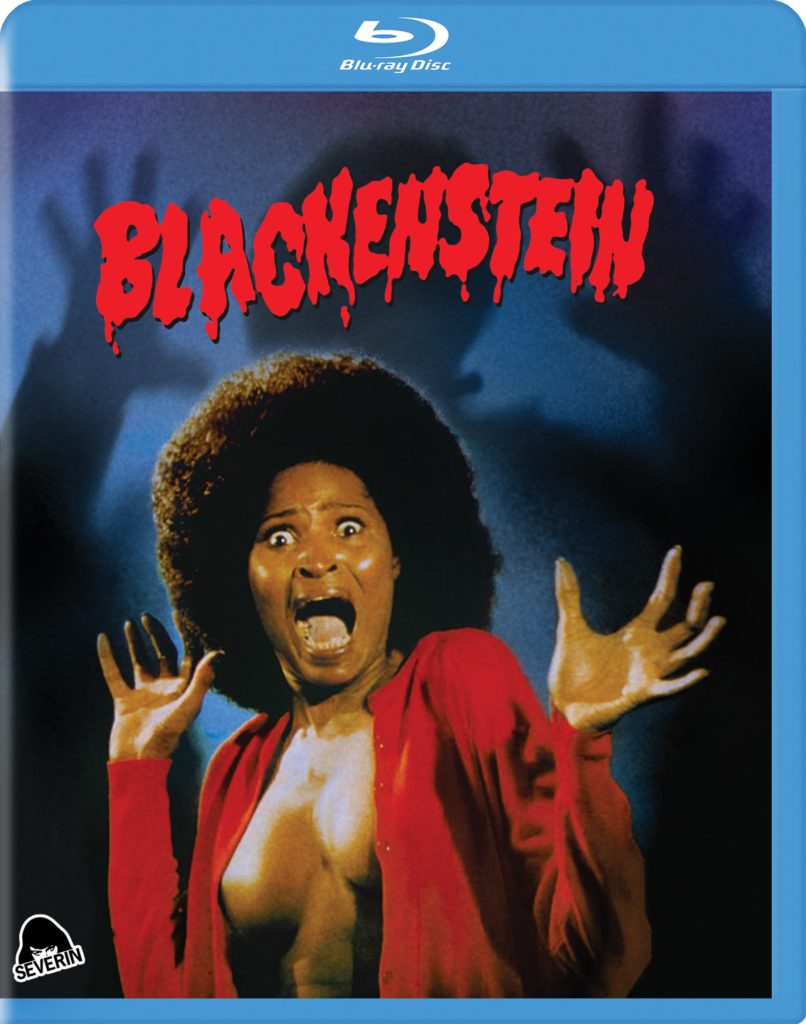

No Comments